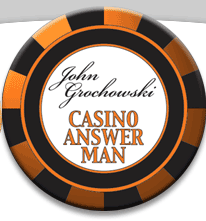Casino lore is full of myths, legends and superstitions.
That's natural enough. Few players understand the math, the
odds and percentages that explain what's really going on in the
casino. It's easier to blame that losing streak on someone else's poor
play, and more fun to claim our own smart play led to a big win, than
to make sense of the eternal tide of random results.
I
try to bust casino myths from time to time, but they're persistent.
Rarely does a week go by in which I don't hear from a reader about one
long-held misconception or another. Let's take a look at some of the
most common casino myths:
MYTH: Other players hurt you at the blackjack table.
FACT: Other players sometimes hurt you, but help you just as
often. Their play has no effect on your long-term results.
No one knows what cards are coming next, nor do we know what card
the dealer has face down. The player you think is taking the dealer's
bust card may actually be taking a card that would have given the
dealer a pat hand.
Let's say the player at third base -
the last player to make a hit/stand decision - has a hard 16, and the
dealer has a 6 face up. If the player follows basic strategy, he'll
stand and the dealer will get the next card. If he makes a bad play
and hits instead, the dealer gets the second card down.
Which would you rather the dealer have, the next card or the second
one? Answer: It makes no difference. You don't know what the cards
are, and either is just as likely to be the one that busts the dealer -
or makes his hand.
MYTH: Hot craps tables are likely to stay hot; cold craps tables are likely to stay cold.
FACT: Unless you've found a rare player who can control the
dice, every roll is an independent trial. Past outcomes have no affect
on future results.
Several years ago, I tried an
experiment in which I waited for two consecutive passes, then tracked
the next decision. Of the next 1,000 sequences, 489 were passes -
almost dead on the 494 average expected by random chance. No evidence
there of hot streaks continuing. At the same time, I charted 1,000
sequences starting with two don't passes. The result: 470 wins for
don't bettors, 493 losses and 37 pushes on 12. No evidence for cold
tables, either.
Do hot and cold streaks occur at the craps
table? Sure, just as they do in any game of chance. That's a natural
outgrowth of probability. Can we predict when the streaks are coming?
No. All a hot streak means is that the table has been hot in the past.
That streak has no value in predicting future results. If it did, we
could all stand and watch, waiting for a hot roll, then jump on and
get rich.
MYTH: If the same roulette number comes up
three or four times in a row, it's time to jump off that number - it's
not "due" again for hours.
FACT: Numbers are never
"due" or "not due." On an American wheel with both a 0 and a 00, the
odds against any given number turning up on the next spin are 37-1.
That's true whether the number just hit on the last spin, the last
four spins, or if it hasn't hit at all in a couple of hours. Just as
at the craps table, each trial is independent, and past outcomes have
no effect on future results.
Rarely, a wheel may be
biased, with some numbers turning up more often than expected by
random chance. The wheel may be off balance, there may be a warp or a
loose fret. In such cases, a number that has been showing up
frequently may continue to hit more than once per 38 spins. Finding a
wheel bias is painstaking work that most of us won't do. Still, the
long shot that a wheel is biased gives us more reason to stay with a
repeating number than to jump off.
MYTH: The casino can reward slot players by pushing a button to let them win a jackpot.
FACT: There is no jackpot button in the casino front office, the
surveillance room or anywhere else. The casino has no control over
when jackpots hit.
The closest the casino has to control
is in programming it orders from the slot machine manufacturer. The
manufacturer offers chips that will make a game pay out at different
levels - the casino might order an 89 percent chip, or a 92 percent
chip on the same penny game. Some games might pay the top jackpot an
average of once per 10,000 pulls; on others the jackpot might hit only
once per 20,000, 100,000, even 1 million or more pulls.
All those are long-term averages. Given millions of pulls, those
averages will hold up. But there's no way to predict, or change, what
will happen on any specific spin of the reels. Each spin is as random
as humans can program a computer to be. A casino can't make a jackpot
appear on the next spin. There will be winners and losers. The casino
can't determine who will be which. It just knows the losers will more
than balance out the winners.

No comments:
Post a Comment